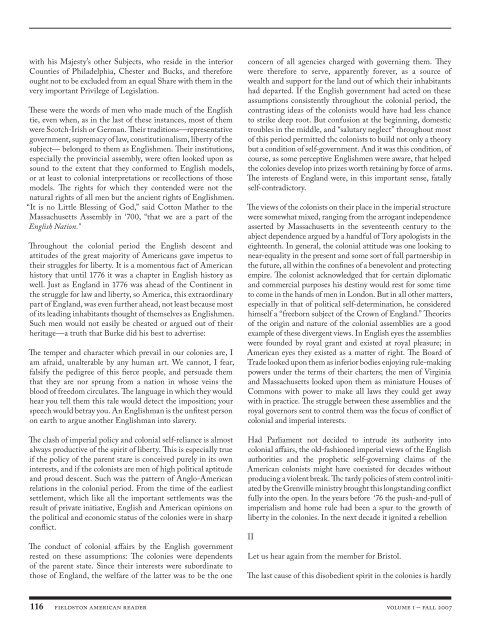fieldston american reader volume i â fall 2007 - Ethical Culture ...
fieldston american reader volume i â fall 2007 - Ethical Culture ...
fieldston american reader volume i â fall 2007 - Ethical Culture ...
- No tags were found...
You also want an ePaper? Increase the reach of your titles
YUMPU automatically turns print PDFs into web optimized ePapers that Google loves.
with his Majesty’s other Subjects, who reside in the interiorCounties of Philadelphia, Chester and Bucks, and thereforeought not to be excluded from an equal Share with them in thevery important Privilege of Legislation.These were the words of men who made much of the Englishtie, even when, as in the last of these instances, most of themwere Scotch‐Irish or German. Their traditions—representativegovernment, supremacy of law, constitutionalism, liberty of thesubject— belonged to them as Englishmen. Their institutions,especially the provincial assembly, were often looked upon assound to the extent that they conformed to English models,or at least to colonial interpretations or recollections of thosemodels. The rights for which they contended were not thenatural rights of all men but the ancient rights of Englishmen.“It is no Little Blessing of God,” said Cotton Mather to theMassachusetts Assembly in ‘700, “that we are a part of theEnglish Nation.”Throughout the colonial period the English descent andattitudes of the great majority of Americans gave impetus totheir struggles for liberty. It is a momentous fact of Americanhistory that until 1776 it was a chapter in English history aswell. Just as England in 1776 was ahead of the Continent inthe struggle for law and liberty, so America, this extraordinarypart of England, was even further ahead, not least because mostof its leading inhabitants thought of themselves as Englishmen.Such men would not easily be cheated or argued out of theirheritage—a truth that Burke did his best to advertise:The temper and character which prevail in our colonies are, Iam afraid, unalterable by any human art. We cannot, I fear,falsify the pedigree of this fierce people, and persuade themthat they are nor sprung from a nation in whose veins theblood of freedom circulates. The language in which they wouldhear you tell them this tale would detect the imposition; yourspeech would betray you. An Englishman is the unfitest personon earth to argue another Englishman into slavery.The clash of imperial policy and colonial self‐reliance is almostalways productive of the spirit of liberty. This is especially trueif the policy of the parent stare is conceived purely in its owninterests, and if the colonists are men of high political aptitudeand proud descent. Such was the pattern of Anglo‐Americanrelations in the colonial period. From the time of the earliestsettlement, which like all the important settlements was theresult of private initiative, English and American opinions onthe political and economic status of the colonies were in sharpconflict.The conduct of colonial affairs by the English governmentrested on these assumptions: The colonies were dependentsof the parent state. Since their interests were subordinate tothose of England, the welfare of the latter was to be the oneconcern of all agencies charged with governing them. Theywere therefore to serve, apparently forever, as a source ofwealth and support for the land out of which their inhabitantshad departed. If the English government had acted on theseassumptions consistently throughout the colonial period, thecontrasting ideas of the colonists would have had less chanceto strike deep root. But confusion at the beginning, domestictroubles in the middle, and “salutary neglect” throughout mostof this period permitted thc colonists to build not only a theorybut a condition of self‐government. And it was this condition, ofcourse, as some perceptive Englishmen were aware, that helpedthe colonies develop into prizes worth retaining by force of arms.The interests of England were, in this important sense, fatallyself‐contradictory.The views of the colonists on their place in the imperial structurewere somewhat mixed, ranging from the arrogant independenceasserted by Massachusetts in the seventeenth century to theabject dependence argued by a handful of Tory apologists in theeighteenth. In general, the colonial attitude was one looking tonear‐equality in the present and some sort of full partnership inthe future, all within the confines of a benevolent and protectingempire. The colonist acknowledged that for certain diplomaticand commercial purposes his destiny would rest for some timeto come in the hands of men in London. But in all other matters,especially in that of political self‐determination, he consideredhimself a “freeborn subject of the Crown of England.” Theoriesof the origin and nature of the colonial assemblies are a goodexample of these divergent views. In English eyes the assemblieswere founded by royal grant and existed at royal pleasure; inAmerican eyes they existed as a matter of right. The Board ofTrade looked upon them as inferior bodies enjoying rule‐makingpowers under the terms of their charters; the men of Virginiaand Massachusetts looked upon them as miniature Houses ofCommons with power to make all laws they could get awaywith in practice. The struggle between these assemblies and theroyal governors sent to control them was the focus of conflict ofcolonial and imperial interests.Had Parliament not decided to intrude its authority intocolonial affairs, the old‐fashioned imperial views of the Englishauthorities and the prophetic self‐governing claims of theAmerican colonists might have coexisted for decades withoutproducing a violent break. Thc tardy policies of stem control initiatedby the Grenville ministry brought this longstanding conflictfully into the open. In the years before ‘76 the push‐and‐pull ofimperialism and home rule had been a spur to the growth ofliberty in the colonies. In the next decade it ignited a rebellionIILet us hear again from the member for Bristol.The last cause of this disobedient spirit in the colonies is hardly116 <strong>fieldston</strong> <strong>american</strong> <strong>reader</strong> <strong>volume</strong> i – <strong>fall</strong> <strong>2007</strong>
















